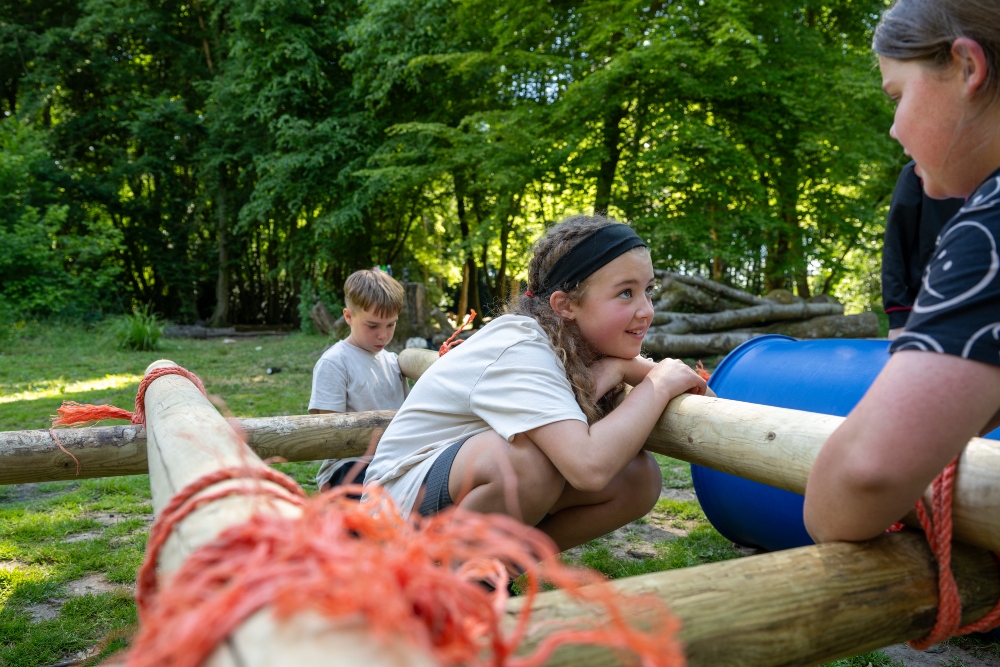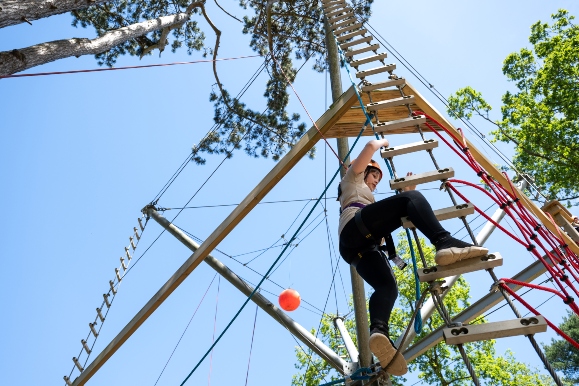
There are endless benefits of staying at a school residential activity centre, from developing new skills to learning outside the classroom, and residential activity centres contribute to improved self-belief, deeper connections, resilience and a sense of well-being.
But as with everything, activity centres can vary massively. Selecting a school residential trip provider capable of delivering safe and enjoyable outdoor education is paramount for educators and parents alike, so what should you consider when choosing the right school residential activity centre?
The location of your residential trip activity centre
Choose a location that is easily accessible. Coach travel has become very expensive, so keep the coach journey reasonable for financial reasons, but also because no one wants to be on a coach for hours. Keep travel times to a minimum, so everyone spends less time cooped up on a coach and more time enjoying the great outdoors.
A shorter journey also allows pupils who can’t stay the night for any reason to be able to join, and even Senior Leadership can attend for the day without staying overnight, giving greater flexibility and keeping the trip more inclusive.
The range of activities
Having good quality outdoor activities that children will get the most out of is a must, but this doesn’t just mean conquering the high ropes and scaling walls, it means ensuring that they offer a good range of activities that balances adrenaline experiences with memorable, fun, collaborative, outdoor adventures. This combination enhances their activity experiences and their life experiences.
A woodland setting is ideal for adrenaline-fuelled activities and Bushcraft skills, outdoor adventures, exploring the natural environment, and even cosy evening sing-alongs around the campfire. You may also want open space for games and time to chill out so that children also have time to relax, think and reflect on their experience.

Quality badges for activity centres
Look for a provider who has a recognition of quality from an external body, such as The Council for Learning Outside the Classroom. The LOtC is a reputable national charity established over two decades ago to promote outdoor learning and support organisations seeking high-quality outdoor education opportunities for students.
The LOtC quality badge is endorsed by the Department of Education and using a school residential activity centre that holds the LOtC Quality Badge gives you peace of mind that they have been assessed for their quality of risk management and their education.
Exciting and flexible choice of accommodation and good amenities
Make the accommodation part of the adventure by choosing somewhere with inspiring and creative accommodation. Think about the time of year you are going, if it is in the Autumn or Winter, somewhere with cosy pods and underfloor heating, like the ones at Rootd are ideal, as they are painted with woodland murals and designed to feel like they are bringing the outside in. If it’s in the Summer, nothing beats a bell tent with bunk beds in a curated woodland village.
As well as sleeping arrangements, accommodation can include chill-out spaces with beanbags, a games area, and even a learning Tipi in the middle of the woods!
Great food
Ensure you find somewhere that caters for all dietary requirements but that also makes good food and offers a range of tasty, nutritious dishes, created for children’s (sometimes picky) palates.
Not overwhelming for younger children
A child’s first visit to a school residential activity centre should be inspiring. For Year 3 and 4 students, a shorter school residential trip designed for younger children can be the perfect introduction to outdoor learning and adventure. Children still experience the excitement of being away from home with their class, but without the higher costs, extra time away from home and timetable disruption that often comes with a longer stay.
A school residential trip for Years 3 and 4 should focus on fun and building confidence and resilience through a range of nature-based activities. Working together, children have a chance to test themselves away from the classroom and develop important life skills, including:
- Listening skills
- Problem-solving
- Social skills
- Teambuilding
Inspiring group leaders
On a school residential trip, you want a team that sees leading outdoor adventures as not just a job but for it to be their passion. You want team leaders who get stuck into every activity, engage and communicate with children, and quickly become part of the group. Children pick up on their leader’s excitement and feel even more inspired to get involved.
Safeguarding
Selecting a school residential trip provider capable of delivering safe and enjoyable outdoor education is paramount for educators and parents alike. Always ensure that the activity residential centre has systems in place that are tried and tested and well thought out.
Activity centres for year round school trips
Visiting a school residential activity centre is fantastic and beneficial at any time of year (and there truly are plenty of benefits), but don’t get caught up thinking it is a summer term activity. Autumn and winter are great times to be outside. Shorter days and the cooler weather allow you to enjoy activities that don’t work in the hot summer term, such as,
- Night walks
- Astronomy and star gazing
- Evenings spent telling stories and toasting marshmallows around the fire
- Exploring in the dark
- Autumn bushcraft activities with fallen leaves, acorns, and (of course) conkers!
- Enjoying the bracing, changeable weather
- Tracking animals is easier in autumn
- Building a year-round love of nature and the outdoors
Trips outside the summer term tend to be cheaper, so find a school residential activity centre that will pass the savings on to you, making the trip more affordable for schools and parents.
Value for money
The sharp surge in the cost of living has forced most families to think carefully about their spending, and with overseas excursions costing anything between £700 and £3,000 for 4 to 7 nights, the financial barrier becomes insurmountable for countless UK households.
UK School Trips offer better value for money than trips abroad, with an average cost of £200 to £500, presenting a much more feasible option. By keeping the costs down, you can foster inclusivity by ensuring a broader spectrum of students can take part in these enriching experiences.
Rootd take pride in offering all the above and more!
Our school residential activity centre was designed with children in mind, so everyone leaves feeling more confident, resilient and proud of what they’ve accomplished in their time away from home. We love creating outstanding residential trips for pupils that are loved by teachers too, and our adventures create unforgettable memories.
Contact us today we’re ready to help build your perfect residential trip.